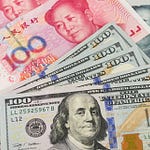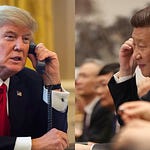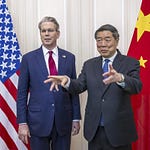Highlights
New positive development of China’s data market
China's recent approval for cross-border data transmission, notably with players like Qichacha in the landscape, signifies China’s commitment to nurturing a resilient data market.
Dispelling misconceptions, our outlook on this development remains one of optimism. Far from a data conspiracy, this move serves as tangible proof of China's attempts to refining its data regulatory framework for the build up of a market and economy on data.
There’s a need to distinguish bureaucratic processes from deliberate secrecy, fostering a nuanced understanding. Navigating this dynamic regulatory landscape requires patience as the system matures.
A new consensus being formed amongst China
Voices from China investment giants like PAG(Shan Weijian), KKR(Henry McVey), Hong Shan/Sequoia China (Neil Shen), Primavera (Fred Hu) and Ping An Insurance(Ben Deng) are sharing a new narrative on China's economic prospects.
The return of foreign limited partners to China signifies a growing interest in understanding and navigating the complexities of the Chinese investment landscape.
Shan, in particular, confronted the problems heads on. In his recent report, Shan acknowledges the severity of the real estate downturn, a historic growth driver. However, he argues that it won't be a lethal blow to the Chinese system. Shan conducts a systematic review of Chinese government debts, emphasizing control over assets, and mitigating the risk of a Western-style financial crisis.
We expanded this point in the podcast. Potential pillars of China's future growth, such as China's new economy, green economy and high-tech industries, will lay a new foundation for China's economic growth. However, the transformation is a gradual process and we still need to be patient for the results
Navigating the investment landscape in China presents undeniable challenges, reminiscent of the early stages of tech investment in the 2010s. Acknowledging these hurdles is crucial, and we emphasize the shared theme of overcoming initial challenges, underscoring the importance of perseverance and adaptability for investors. Delving deeper, we recognize the significance of identifying potential new economic pillars, particularly in the realms of the new energy sector and the Belt and Road initiative.
Extra materials:
Board of Changemakers" panel featuring H.E. Yasir Al-Rumayyan, Ray Dalio, Jamie Dimon, Laurence D. Fink and Jane Fraser, Dr. Patrice Motsepe, Noel Quinn, David Rubenstein, Stephen A. Schwarzman, Neil Shen, David Solomon, and Shemara Wikramanayake
Re-Evaluating the Chinese Economy. Benjamin Deng, Chief Investment Officer, Ping An Group, Fred Hu, Founder and CEO, Primavera Capital, Gary Rieschel, Founding Managing Partner, Qiming Venture Partners, Jennifer Welch, Chief Geo-Economics Analyst, Bloomberg Economics discuss with Tom Orlik, Chief Economist, Bloomberg Economics at the 2023 Bloomberg New Economy Forum in Singapore.
Full transcript
[00:00:00] Mu: Recently one of the company registration data vendors in China, Qichacha, has announced that They got approval to transmit data across border. This is in line with our expectation.
Half a year ago China has set up this process for a company to apply to transmit their data across border. While that episode was interpreted by many foreign media as China creating a new information black box, we think that it was just a new process to build an economy and market around data as a production factor.
Time and time again, we keep mentioning that the core principle for China's policy is to build a market and economy around data as a production factor. That's an initiative started in 2019. It takes time for all these policies to mature. It's a big system, there's a lot of stakeholder within the system. There might be glitches during the processes, but it shouldn't be understood as a hidden agenda for China to hide data from global user or from the world. So it has always been our view and Qichacha's news that's a proof of our view.
[00:01:22] Robert: To review our basic logics when we explained this a few months ago. It just doesn't make sense for China to so called lock the information into some kind of black box. We're living a information age. There's no such thing that you can really lock so much information from outside view while you are also engaged in international trade and investment. It simply doesn't make sense, although it fits some people's stereotypes about China, being a closed a system where there's just big control on everything.
So at the time, there was a very strong narrative in Western media portraying China into this type of place. That's one thing. Another thing is, we should not confuse bureaucratic inefficiency and inertia with any conspiracy or any well -concerted effort to crack down on data or information.
China's data regulatory regime is very young. It just started from almost nothing about three or four years ago. Ranging from personal data to you know, what they call important data. And all these laws and regulations are very young. I still remember, five or six years ago, people like to joke that there was no privacy in China
All of the data is sold out and that created a lot of problems. But only in a matter of a few years, people now, today, are very sensitive about data. A lot of companies won't work on data related stuff, even though there is better rules. But people are actually over sensitive now about data regulation.
So that takes a just a matter of few years for, for China to develop from zero regulation to there is regulation. WHen a new entirely piece of a new regulation framework comes online, it will take time to figure out all the details, all the implementations. So that takes a process. We wish the process can take place instantly.
We always wish this can be faster, but, bureaucracy has their own pace. We would just take this example as a classic case study that when you look at China, maybe try a little bit harder to be more patient and don't easily jump onto some kind of Ideological explanation for everything you see.
To me, this is a very illuminating case.
[00:04:17] Mu: To add on that just now I mentioned about the many forces in play, trying to have a say in the data production factor markets. I'd like to give our audience a more vivid example, if someone is applying for a data permission or transmission about, you know banking data, the department that are involved to make the decision would be the local government, the CAC, but not just that, there will be also ministry of technology, as well as, the central bank and the new data bureau. lIke Robert said, it's more about bureaucracies coordinating, making sure who is in charge of which part of the approval rather than bureaucracy or the apparatus not wanting to implement the process. Central Bank want to have a say, CAC want to have a say, Data Bureau have a say, so as an applicant they have to go to all these Ministries and go to all this window to apply to submit their application. It's Actually not unique to China. If you do that in the US, in, different country, UK, in Europe, you also have to go through different departments approval process. So there's a difference between a hidden agenda and or ideological agenda and the bureaucracy process.
Anyhow this is good news. It's a positive indication for China's data market, and for folks that want to get more data on China we can see that there's a step forward. On this aspect, on this issue.
And in terms of the expectation, we know that many companies or many data owners are also looking into transmitting the data overseas. At the national level, China itself is also looking into frameworks of cross border data transmission. During the Belt and Road Initiative, we saw that many framework agreements have been signed, and within those framework agreements data has been mentioned.
For example, cross border e commerce collaboration for Belt and Road Initiative, right? Within that framework, you know, data is a must. And we saw that, the updated rules for oversee data transmissions also exempted, part of the data transmission that's in e commerce industry.
So they don't have to go through the application process. We're expecting the regulation to mature, but it's not going to be a linear maturation process. You'll be two step forward, one step backward.
So that's on the data. And in terms of changing gear, we are seeing that there are more and more update rhetorics about investing in China. My feeling is that a new consensus is being formed on
1) if China is investible, that's turning from a negative answer to a positive answer.
2) if China is investible. How to invest in China?" what kind of assets are investable in China?
3) is it secure to invest in China?
So more and more we're seeing different cases across board, about understanding the current situation in China, including the real estate situation, the macroeconomic situation and the new rhetoric also are more respective of the actual economic structure in China.
Our fellow writers Jiang Jiang from Ginger River Review , recently published the article from Shan Weijian 单伟建, the founder of PAG. Robert, you have dived deep into the report. Can you talk more about that?
[00:08:04] Robert: Yeah, it's a very interesting report. It's, as you said, a kind of a new rhetoric is being formed. And in this sense, a lot of the big shots are coming onto the stage and be quite vocal about their opinions. So Mr. Shanwei Jian of PAG is a very good casing point. A little bit background about PAG is, I would say it's one of the largest private equity funds in greater China region and and Mr. Shan himself has been, over the last couple of decades have been involved in some of the most landmark deals in China that included you know, when he was at TPG, the merger and acquisition of Shenzhen Development Bank. And at PAG, he did a lot of Very big deals, including some of the largest ever private equity buyout deals in the history of China.
When he's starting to publicly voice his opinions people should listen. So I did read his report and I find it quite informative. He actually took on this question. Whether China is investable, is Chinese economy doomed what are the new opportunities?
You know, all these very big questions head on. So he is pretty explicit and frank about China's current problems. And I think to him, a big problem is this real estate malaise, right? Basically, over the last two decades or so, a strong, the biggest pillar of China's growth is real estate industry.
And that industry is kind of falling off the cliff right now. And so he takes that as an assumption and look at, you know, what exactly kind of impact will it have on China? And and his conclusion is: although this is bad, it's not lethal for the Chinese system. There are several interesting angles he takes.
One big kind of consequence of this real estate thing going down is the drag on local government finances. So, a lot of people are concerned about the public debt situation in China. So he did a very concise but also systematic review of both the the Chinese government's debts and also the banking system.
For example, he look at the total debt in China, for the central government, it's actually a pretty low debt ratio. The main problem is in the local government but even if, even if you take all those debt together compared with, you know, Western countries like U. S. and Japan, it's actually not such a big it's even lower than some of those countries. And also, you know, an interesting point he makes is you know, Chinese government is also different from other government in the way that they control a lot of assets. So the asset quality, you know, including the, the state owned enterprises, the land resources, all of these asset qualities maKe the net assets of the country, of the government to be of pretty high quality. So that ensures that the current I would say crisis is not going to balloon into a Western sense of, you know, financial crisis. He draws that line pretty eloquently that there's a limited systematic risk.
And then he goes on to explore what exactly will be the pillar? He is very detailed and also and, and very optimistic about the technological growth in China. In this case, he quoted the KKR Asia Report, which we also shared last time at podcast, which also quoted data from us. Mr. Shan, he quoted KKR's report specifically about the sections about the new economy, the green economy, the high tech economy in China and the growth of the, manufacturing value added. All that was going to be a new pillar for China.
I think he's very explicit about that.
We also agree with him. We also want to point out that technological progress, this climbing up the value chain, is not going to be successful instantly. It takes time to build. It's actually harder than building out buildings and towns. Technology takes time, takes the, the talents, takes accumulation of both know how and capital and also the good market for the technology. So it's going to be a process. And that process will bear fruit. It's again, come back to the, the patience, right?
Be patient for the economy. And, I think it just will take some time, but, it will you know, we will see the fruits one day.
[00:13:29] Mu: Yeah. We can expand more on that. To do some comparative study. Right. You mentioned about, the first part is, he's mentioned about China's real estate bubble being bursted. We want to remind our audience that unlike how real estate bubble burst in other countries, China actually proactively tried to cool down the real estate market initially a couple years ago.
So, and the rhetoric about it. it at the government level, is that we want to cool down the real estate industry. From this perspective, they are very transparent about it. That's the difference.
Meanwhile, if we look at the balance sheet like , Shan mentioned in his report, and like Robert mentioned the balance sheet overall, national balance sheet of China is healthy. Every time there's talk about big debt crisis or China's debt level, I always compare it against The total savings of the Chinese economy there's over 200 trillion RMB savings in the Chinese economy. That's aggregation of private individual savings plus company saving.
Retail consumers saving there's over a hundred trillion RMB. So we need to put different debt issues and different, you know numbers in perspective by looking at this broader number. And that's what Shan did. And that would be helpful for many of our audience who are looking into macro of China and And so the key here is actually more sentimental, right?
People are saving more That they are not spending as much. So the government's job is really to strategically mobilize this capital, this wealth, to address different problems. And that's why we are seeing this special sovereign bond we mentioned in the last episode as a tool for the government to hopefully borrow from the savers.
And then transfer those savings into, directing this state saving into, you know spending or investment that would revitalize the economy. So, having that big background would actually put things in perspective. I think it's easier for analysts to draw metaphor or draw comparison between China's current situation and a similar situation happened previously in other countries. So initially there's talk about real estate bubble. Turn it into a Lehman like episodes, right? A few weeks ago, there's talk about Lehman moments, right, for China.
[00:16:11] Robert: I don't think there's a Lehman moment the system just just wire totally differently the US system the Chinese system.
[00:16:18] Mu: So there's, they talk about Lehman moment, but if you look at the deeper, like you said, the system, the fundamental of these episodes, it's going to be different. The government itself is managing, whether good or bad, the unfold of this moment or this episode about real estate bubble burst.
And then there's talk about balance sheet crisis. Another metaphor people trying to draw between China and Japan in the 90s. But then if you look at the overall balance sheet, it's actually also different. There's no external force that's forcing China to up their currency valuations and restraining, China's monetary policy and room for maneuvers unlike what Japan experienced in the 90s. So that's the context.
One key point that we need to bear in mind is that China has all this historical lesson to draw from, you know. They saw how 08 09 unfolded, right? They saw how Japan dealt with the balance sheet crisis, dealt with the population crisis, right? So as a followers, they actually have the lesson to draw from and they are trying to do things that differently right from those lessons.
There are scholars that study all these episodes that unfolded in other countries previously, and they are, trying to get the lesson learned. So keep in mind all these episodes that China is experiencing has happened in other countries, and from our point of view, given that Chinese government has this pragmaticphilosophy, when setting their policies, they will take into consideration of the historical lesson.
Besides Shan, we also saw similar rhetorics among other investors. In an under reported event that I recently saw at Middle East Neil Shen, right, the head of Hongshan Sequoia China, was in a roundtable with the head of Other big global financial institutions like Blackstone, BlackRock, Goldman Sachs, and Morgan Stanley, talking about China. His narrative is that you've got to take a long term view about China. There's cycles and this is the first down cycle that's experienced in China and in the long run China will work out all these downturn cycles problem. Around the same time, at Bloomberg's new economy forums in Singapore, the head of Ping An Insurance as well as the head of a large private equity, primavera in China, also, talk about China at the forums. Robert told me that, actually, the report about Fred Hu sharing is actually more negative. What was that rhetoric in some of the media's reporting?
[00:19:10] Robert: I think a lot of people just seize on his line that he thinks the entrepreneur's confidence has been the lowest he saw since 1978, which is like the beginning of reform and opening and the end of cultural revolution. So, so that line is quite startling. But I think he actually put that into a bigger context, which he is advocating for more you know, deeper and structural economic reforms to make businesses to be more confident. He, I think overall what he's arguing for is a reform agenda .Not really just trying to sound a pessimistic view.
When he share in that conference it's similar with how Mr. Shan Wei Jian came out to, to voice their opinions. It just seems now the big titans of finance feel it's the time now for them to have their say as well, to make their voice heard.
And I think they will not do it unless they feel that, you know, right now the general atmosphere is also shifting towards more reforms, more growth, more confidence. You know, for our, from our perspective, we like to put that into that kind of context, instead of just taking a line and say, Oh, China is going to, you know, going all downhill.
I think that's a very different angle.
[00:20:39] Mu: Yeah. I think this is a good signal, right? Not that all these investors are planning to put out the same rhetoric at the same time. There's no such, you know, circle or community that they're exchanging views together. But if we look at that, Shan Wei Jian publish an article. Neil shen recently went to Saudi Arabia to talk about that. There's this head of ping Insurance, one of the largest insurers as well as asset locators in China, which is a state-owned company and Primavera another leading PEs in China. And us, right? I went to China projects seminar recently with Liao Ming which is the head of PAC, another growth capital investors. China, who is very vocal. They all sharing this view about, investing in China. There's a saying in China called 春江水暖鸭先知, when spring comes, the water gets warm, but the ducks will feel it first.
In our view, the capitalist or the investor, we shouldn't use the capitalist term, the investors are the ones that are seeking profits, seeking new opportunities.
The fact that, there's a group of them going there to speak out about investing in China. It's a signal that we can chew on, and another anecdotal note I'd like to mention is that, recently in Shanghai also saw that during the annual general meeting of a couple of leading venture capital in China, we saw a foreign LP, foreign limited partner. Conventional big allocators in Europe, in the U. S., now are coming back to China first time in three years and four years to meet with their general partner which are the VCs and PEs in China, right? But my, when I talk to them, they are still... refreshing and updating their views on China. So I think there'll be a process for that. There are the early adopters like KKR, like Shan Weijian, who spend more time and resources on the ground, who have an early updates of their investment framework on China, and then slowly we are seeing that the mainstream investors are also adopting and appreciating the new framework.
But one reality that's also part of consensus is that it's not easy to invest in China. It wasn't easy before, it wasn't easy now, because it's different culture, it's different system. If we think about the tech investment and the consumer investment, the beginning of the tech investment in China in the 2010s, in the early 2000s, it was hard for VC to invest or find investable targets in China. Just for context, Tencent's founder Pony Ma almost sold his company earlier in his venture because he couldn't find funding. So if we put that context into now, for the new industries, the new economies, new manufacturers, upgrades, new energy sectors in China, we are going to, we should expect similar cycles happening, where global investors trying to find their way, trying to find their footholds. And find a position in China. The founders trying to connect with the investors and build up a market.
So this should be expected for the new industries that's one point.
The other thing is that, because I was in the U. S. during the 0908 and 2010, Great Recessions, we also had that feelings in the U. S. right back then, if real estate falls down, what would be the next pillar of the economy? There's a tendency for people to find a simple answer for their framework because it's easier to have a simplistic framework for their decision making. But in the U. S. after the financial crisis, there wasn't clear pillar for the US economy, right? There's no one single answer for that. But US also come out from that crisis after a couple of years. Because it has a resilient economy, and China too has a resilient economy. There's all these basic economics activity that's being conducted.
The foundations are still there, that will continue to grow. Meanwhile, different from the U. S. back then, China has a few potential new pillars that within our visibility, which is the new energy sector, the Belt and Roll initiative, where China can have their manufacturer capability exported right to other countries.
So in comparison, the context and situation China is sitting in now is as not as bad as oh 8, 0 9 in the US.
[00:25:54] Robert: Great.














